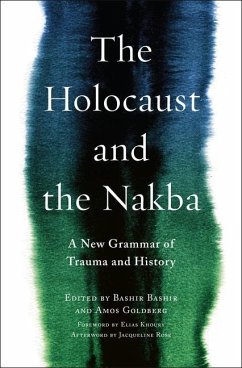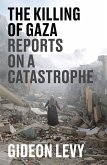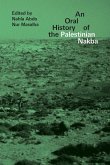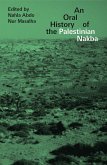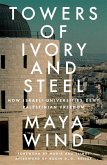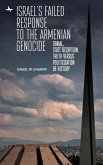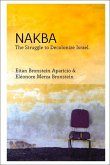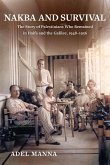The Holocaust and the Nakba
A New Grammar of Trauma and History
Herausgeber: Goldberg, Amos; Bashir, Bashir
The Holocaust and the Nakba
A New Grammar of Trauma and History
Herausgeber: Goldberg, Amos; Bashir, Bashir
- Broschiertes Buch
- Merkliste
- Auf die Merkliste
- Bewerten Bewerten
- Teilen
- Produkt teilen
- Produkterinnerung
- Produkterinnerung
In this groundbreaking book, leading Arab and Jewish intellectuals examine how and why the Holocaust and the Nakba are interlinked without blurring fundamental differences between them. It searches for a new historical and political grammar for relating and narrating their complicated intersections.
Andere Kunden interessierten sich auch für
![The Killing of Gaza The Killing of Gaza]() Gideon LevyThe Killing of Gaza16,14 €
Gideon LevyThe Killing of Gaza16,14 €![An Oral History of the Palestinian Nakba An Oral History of the Palestinian Nakba]() An Oral History of the Palestinian Nakba35,99 €
An Oral History of the Palestinian Nakba35,99 €![An Oral History of the Palestinian Nakba An Oral History of the Palestinian Nakba]() An Oral History of the Palestinian Nakba97,99 €
An Oral History of the Palestinian Nakba97,99 €![Towers of Ivory and Steel Towers of Ivory and Steel]() Maya WindTowers of Ivory and Steel16,99 €
Maya WindTowers of Ivory and Steel16,99 €![Israel's Failed Response to the Armenian Genocide Israel's Failed Response to the Armenian Genocide]() Israel W. CharnyIsrael's Failed Response to the Armenian Genocide93,99 €
Israel W. CharnyIsrael's Failed Response to the Armenian Genocide93,99 €![Nakba Nakba]() Eitan Bronstein AparicioNakba40,50 €
Eitan Bronstein AparicioNakba40,50 €![Nakba and Survival Nakba and Survival]() Adel MannaNakba and Survival31,99 €
Adel MannaNakba and Survival31,99 €-
-
-
In this groundbreaking book, leading Arab and Jewish intellectuals examine how and why the Holocaust and the Nakba are interlinked without blurring fundamental differences between them. It searches for a new historical and political grammar for relating and narrating their complicated intersections.
Hinweis: Dieser Artikel kann nur an eine deutsche Lieferadresse ausgeliefert werden.
Hinweis: Dieser Artikel kann nur an eine deutsche Lieferadresse ausgeliefert werden.
Produktdetails
- Produktdetails
- Religion, Culture, and Public Life
- Verlag: Columbia University Press
- Seitenzahl: 424
- Erscheinungstermin: 13. November 2018
- Englisch
- Abmessung: 233mm x 154mm x 27mm
- Gewicht: 668g
- ISBN-13: 9780231182973
- ISBN-10: 023118297X
- Artikelnr.: 52713441
- Herstellerkennzeichnung
- Libri GmbH
- Europaallee 1
- 36244 Bad Hersfeld
- gpsr@libri.de
- Religion, Culture, and Public Life
- Verlag: Columbia University Press
- Seitenzahl: 424
- Erscheinungstermin: 13. November 2018
- Englisch
- Abmessung: 233mm x 154mm x 27mm
- Gewicht: 668g
- ISBN-13: 9780231182973
- ISBN-10: 023118297X
- Artikelnr.: 52713441
- Herstellerkennzeichnung
- Libri GmbH
- Europaallee 1
- 36244 Bad Hersfeld
- gpsr@libri.de
Bashir Bashir is Associate Professor in the Department of Sociology, Political Science, and Communication at the Open University of Israel and a senior research fellow at the Van Leer Jerusalem Institute. He is coeditor of The Politics of Reconciliation in Multicultural Societies (2008). Amos Goldberg is Associate Professor and Chair of the Department of Jewish History and Contemporary Jewry at the Hebrew University of Jerusalem. His books include Trauma in First Person: Diary Writing During the Holocaust (2017). Elias Khoury is a literary critic and novelist whose books include Gate of the Sun. Jacqueline Rose is a professor of humanities at the Birkbeck Institute for the Humanities.
Foreword: Elias Khoury
Introduction: The Holocaust and the Nakba: A New Syntax of History, Memory,
and Political Thought, by Bashir Bashir and Amos Goldberg
Part I. The Holocaust and the Nakba: Enabling Conditions to a New
Historical and Political Syntax
1. Harbingers of Jewish and Palestinian Disasters: European Nation-State
Building and Its Toxic Legacies, 1912-1948, by Mark Levene
2. Muslims (Shoah, Nakba), by Gil Anidjar
3. Benjamin, the Holocaust, and the Question of Palestine, by Amnon
Raz-Krakotzkin
4. When Yaffa Met (J)Yaffa: Intersections Between the Holocaust and the
Nakba in the Shadow of Zionism, by Honaida Ghanim
5. Holocaust/Nakba and the Counterpublic of Memory, by Nadim Khoury
Part II. The Holocaust and the Nakba: History and Counterhistory
6. When Genya and Henryk Kowalski Challenged History-Jaffa, 1949: Between
the Holocaust and the Nakba, by Alon Confino
7. A Bold Voice Raised Above the Raging Waves: Palestinian Intellectual
Najati Sidqi and His Battle with Nazi Doctrine at the Time of World War II,
by Mustafa Kabha
8. What Does Exile Look Like? Transformations in the Linkage Between the
Shoah and the Nakba, by Yochi Fischer
9. National Narratives of Suffering and Victimhood: Methods and Ethics of
Telling the Past as Personal Political History, by Omer Bartov
Part III. The Holocaust and the Nakba: The Deployment of Traumatic
Signifiers
10. Culture of Memory: The Holocaust and the Nakba Images in the Works of
Lea Grundig and Abed Abdi, by Tal Ben-Zvi
11. Ma'abara: Mizräim Between Shoah and Nakba, by Omri Ben-Yehuda
12. From Revenge to Empathy: Abba Kovner from Jewish Destruction to
Palestinian Destruction, by Hannan Hever
Part IV. On Elias Khoury's Children of the Ghetto: My Name Is Adam:
Narrating the Nakba with the Holocaust
13. Novel as Contrapuntal Reading: Elias Khoury's Children of the Ghetto:
My Name is Adam, by Refqa Abu-Remaileh
14. Writing Silence: Reading Khoury's Novel Children of the Ghetto: My Name
is Adam, by Raef Zreik
15. Silence on a Sizzling Tin Roof: A Translator's Point of View on
Children of the Ghetto, by Yehouda Shenhav
Afterword: The Holocaust and the Nakba, by Jacqueline Rose
Bibliography
Contributors
Index
Introduction: The Holocaust and the Nakba: A New Syntax of History, Memory,
and Political Thought, by Bashir Bashir and Amos Goldberg
Part I. The Holocaust and the Nakba: Enabling Conditions to a New
Historical and Political Syntax
1. Harbingers of Jewish and Palestinian Disasters: European Nation-State
Building and Its Toxic Legacies, 1912-1948, by Mark Levene
2. Muslims (Shoah, Nakba), by Gil Anidjar
3. Benjamin, the Holocaust, and the Question of Palestine, by Amnon
Raz-Krakotzkin
4. When Yaffa Met (J)Yaffa: Intersections Between the Holocaust and the
Nakba in the Shadow of Zionism, by Honaida Ghanim
5. Holocaust/Nakba and the Counterpublic of Memory, by Nadim Khoury
Part II. The Holocaust and the Nakba: History and Counterhistory
6. When Genya and Henryk Kowalski Challenged History-Jaffa, 1949: Between
the Holocaust and the Nakba, by Alon Confino
7. A Bold Voice Raised Above the Raging Waves: Palestinian Intellectual
Najati Sidqi and His Battle with Nazi Doctrine at the Time of World War II,
by Mustafa Kabha
8. What Does Exile Look Like? Transformations in the Linkage Between the
Shoah and the Nakba, by Yochi Fischer
9. National Narratives of Suffering and Victimhood: Methods and Ethics of
Telling the Past as Personal Political History, by Omer Bartov
Part III. The Holocaust and the Nakba: The Deployment of Traumatic
Signifiers
10. Culture of Memory: The Holocaust and the Nakba Images in the Works of
Lea Grundig and Abed Abdi, by Tal Ben-Zvi
11. Ma'abara: Mizräim Between Shoah and Nakba, by Omri Ben-Yehuda
12. From Revenge to Empathy: Abba Kovner from Jewish Destruction to
Palestinian Destruction, by Hannan Hever
Part IV. On Elias Khoury's Children of the Ghetto: My Name Is Adam:
Narrating the Nakba with the Holocaust
13. Novel as Contrapuntal Reading: Elias Khoury's Children of the Ghetto:
My Name is Adam, by Refqa Abu-Remaileh
14. Writing Silence: Reading Khoury's Novel Children of the Ghetto: My Name
is Adam, by Raef Zreik
15. Silence on a Sizzling Tin Roof: A Translator's Point of View on
Children of the Ghetto, by Yehouda Shenhav
Afterword: The Holocaust and the Nakba, by Jacqueline Rose
Bibliography
Contributors
Index
Foreword: Elias Khoury
Introduction: The Holocaust and the Nakba: A New Syntax of History, Memory,
and Political Thought, by Bashir Bashir and Amos Goldberg
Part I. The Holocaust and the Nakba: Enabling Conditions to a New
Historical and Political Syntax
1. Harbingers of Jewish and Palestinian Disasters: European Nation-State
Building and Its Toxic Legacies, 1912-1948, by Mark Levene
2. Muslims (Shoah, Nakba), by Gil Anidjar
3. Benjamin, the Holocaust, and the Question of Palestine, by Amnon
Raz-Krakotzkin
4. When Yaffa Met (J)Yaffa: Intersections Between the Holocaust and the
Nakba in the Shadow of Zionism, by Honaida Ghanim
5. Holocaust/Nakba and the Counterpublic of Memory, by Nadim Khoury
Part II. The Holocaust and the Nakba: History and Counterhistory
6. When Genya and Henryk Kowalski Challenged History-Jaffa, 1949: Between
the Holocaust and the Nakba, by Alon Confino
7. A Bold Voice Raised Above the Raging Waves: Palestinian Intellectual
Najati Sidqi and His Battle with Nazi Doctrine at the Time of World War II,
by Mustafa Kabha
8. What Does Exile Look Like? Transformations in the Linkage Between the
Shoah and the Nakba, by Yochi Fischer
9. National Narratives of Suffering and Victimhood: Methods and Ethics of
Telling the Past as Personal Political History, by Omer Bartov
Part III. The Holocaust and the Nakba: The Deployment of Traumatic
Signifiers
10. Culture of Memory: The Holocaust and the Nakba Images in the Works of
Lea Grundig and Abed Abdi, by Tal Ben-Zvi
11. Ma'abara: Mizräim Between Shoah and Nakba, by Omri Ben-Yehuda
12. From Revenge to Empathy: Abba Kovner from Jewish Destruction to
Palestinian Destruction, by Hannan Hever
Part IV. On Elias Khoury's Children of the Ghetto: My Name Is Adam:
Narrating the Nakba with the Holocaust
13. Novel as Contrapuntal Reading: Elias Khoury's Children of the Ghetto:
My Name is Adam, by Refqa Abu-Remaileh
14. Writing Silence: Reading Khoury's Novel Children of the Ghetto: My Name
is Adam, by Raef Zreik
15. Silence on a Sizzling Tin Roof: A Translator's Point of View on
Children of the Ghetto, by Yehouda Shenhav
Afterword: The Holocaust and the Nakba, by Jacqueline Rose
Bibliography
Contributors
Index
Introduction: The Holocaust and the Nakba: A New Syntax of History, Memory,
and Political Thought, by Bashir Bashir and Amos Goldberg
Part I. The Holocaust and the Nakba: Enabling Conditions to a New
Historical and Political Syntax
1. Harbingers of Jewish and Palestinian Disasters: European Nation-State
Building and Its Toxic Legacies, 1912-1948, by Mark Levene
2. Muslims (Shoah, Nakba), by Gil Anidjar
3. Benjamin, the Holocaust, and the Question of Palestine, by Amnon
Raz-Krakotzkin
4. When Yaffa Met (J)Yaffa: Intersections Between the Holocaust and the
Nakba in the Shadow of Zionism, by Honaida Ghanim
5. Holocaust/Nakba and the Counterpublic of Memory, by Nadim Khoury
Part II. The Holocaust and the Nakba: History and Counterhistory
6. When Genya and Henryk Kowalski Challenged History-Jaffa, 1949: Between
the Holocaust and the Nakba, by Alon Confino
7. A Bold Voice Raised Above the Raging Waves: Palestinian Intellectual
Najati Sidqi and His Battle with Nazi Doctrine at the Time of World War II,
by Mustafa Kabha
8. What Does Exile Look Like? Transformations in the Linkage Between the
Shoah and the Nakba, by Yochi Fischer
9. National Narratives of Suffering and Victimhood: Methods and Ethics of
Telling the Past as Personal Political History, by Omer Bartov
Part III. The Holocaust and the Nakba: The Deployment of Traumatic
Signifiers
10. Culture of Memory: The Holocaust and the Nakba Images in the Works of
Lea Grundig and Abed Abdi, by Tal Ben-Zvi
11. Ma'abara: Mizräim Between Shoah and Nakba, by Omri Ben-Yehuda
12. From Revenge to Empathy: Abba Kovner from Jewish Destruction to
Palestinian Destruction, by Hannan Hever
Part IV. On Elias Khoury's Children of the Ghetto: My Name Is Adam:
Narrating the Nakba with the Holocaust
13. Novel as Contrapuntal Reading: Elias Khoury's Children of the Ghetto:
My Name is Adam, by Refqa Abu-Remaileh
14. Writing Silence: Reading Khoury's Novel Children of the Ghetto: My Name
is Adam, by Raef Zreik
15. Silence on a Sizzling Tin Roof: A Translator's Point of View on
Children of the Ghetto, by Yehouda Shenhav
Afterword: The Holocaust and the Nakba, by Jacqueline Rose
Bibliography
Contributors
Index

